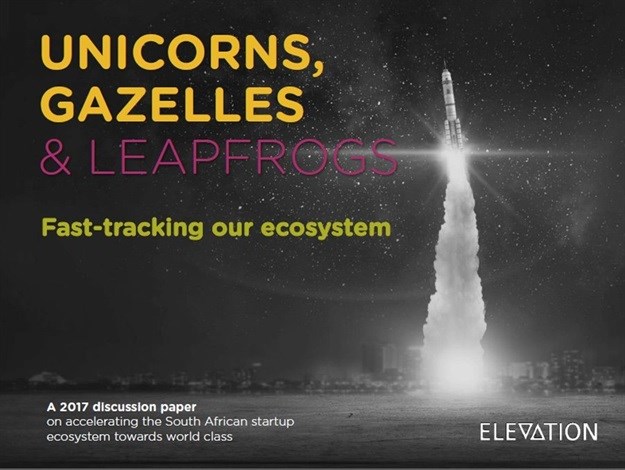A new report, ‘Unicorns, Gazelles & Leapfrogs: Fast-tracking the South African startup ecosystem' identifies some ways that South Africa's hotshot startups can catapult themselves forward.
“The total value of all the tech and innovation startups in Joburg and Cape Town together, is about $1.5 billion: a similar size to Melbourne’s, smaller than Lagos’, and half the size of Sao Paolo’s,” says Jason Levin, author of the report. A little less than 40% of national GDP is generated by SMME businesses, so progress in this small but important ecosystem is critical.
Launched in mid-June 2017, at the Gordon Institute for Business Science in Johannesburg, the report highlights some of the recent successes in the space, which has become so topical locally and internationally in the past few years.
Education tech company, GetSmarter was sold to US-listed 2U in April for $103 million. Fintech businesses such as WiGroup and Yoco are experiencing exponential growth in South Africa and on the continent. Health tech startup, LifeQ, has formed a deep and prosperous relationship with Garmin USA, and recruitment company Giraffe beat out 54 finalists from around the globe in the last Seedstars World entrepreneurship competition. In March 2017, Joburg was the first African city to host the Global Entrepreneurship Summit.
There is progress and seemingly a will to succeed. “However, why does South Africa feel like a middle order contender rather than a podium occupant?” asks Levin.
There is momentum. Moreover, there are resources, including over 300 incubators and entrepreneur development organisations, the R1.5 billion SA SME Fund set up by the CEOs’ Initiative, the overall capital pool has increased substantially in recent years and you cannot throw a stone in Joburg or Cape Town without hitting a startup co-working space.
However, South Africa has not produced a unicorn (a startup valued at $1 billion+) and Nigeria and Poland have. The report aims to answer that and other questions relating to the South African startup landscape. It also looks for options for thrusting the high-growth high-impact small business space rapidly towards world class.
In-depth interviews
Over a six month-period, Levin interviewed and recorded the views of 36 players in the South African startup ecosystem. These included sharp founders of new hot shops to venture capitalists like Keet Van Zyl, Craig Mullett and Brett Commaille to founders like Giraffe’s Anish Shivdasani, Civic’s Vinny Lingham and Mimecast’s Peter Bauer.
These opinions form the backbone of the report. Bolstering the personal and anecdotal insights is research from other studies on the local and global startup landscapes. Putting the two together answers some questions, highlights where the country is excelling and where improvement is needed and, importantly, it looks for an accelerated path for that improvement: what the report calls ‘leapfrogs’.
Skill deficit major blockage
However, from the study, it seems there are numerous blockages. Most notably, a deep skills deficit resulting from an education system largely ill equipped to produce entrepreneurs of calibre.
Levin says the country has to plough through those obstacles, but progress will be slow and fraught. In addition, in order to move the needle, the startup game in South African has to get bigger and better faster. It is important because of the transformative effect that innovative, fast-paced startups have on business generally; to assist in alleviating unemployment and because tech- and innovation-led businesses are growing at 4.5% globally versus overall global economic growth of only 2.6%.
Key recommendations
Therefore, as the key recommendation of the report, Elevation proposes a more lateral approach to the challenges via the ‘leapfrogs’. These are one or two bold and dramatic shake-ups aimed at creating a quantum shift, alongside the required steady improvement, in the South African startup space. Options explored include:
- SA as a resource hub: Whereby a lot of the capacity locked up in incubators that is currently being used to create what is reportedly large numbers of underequipped, soon-to-be-disillusioned entrepreneurs, is redeployed. The resources could be used to educate and upskill talent that could be used to power local and international startups rather than run them. This would also see us market South Africa (Cape Town particularly) as a destination for high quality, lower cost startup-specific skills and resources. This in a pleasant location that is English speaking, has good infrastructure and is on the European time zone.
- Impact investor haven: South African has no shortage of problems to be solved. This route proposes a good deal of startup capacity be focused on developing social entrepreneurship (‘for good’ ventures run along commercial lines). A large portion of our diverse societal and practical challenges may be solved by innovation, and the hope would be that many of the solutions, once adapted, could be exported to other African and emerging markets. This specialised focus would aim to attract the increasing global funding in the impact space.
- Access to public investment funds: Here, ecosystem participants are called on to lobby government to direct public sector pension funds to release 0.5% of their fund into the market as venture capital. The Public Investment Corporation’s share alone would be in the region of R10 billion. Startup demand would then need to be vigorously stimulated to meet capital supply.
- Vertical, sector specialisation: Taking a cue from Poland and other Eastern European markets, South Africa focuses on two or three (maximum) verticals like fintech, medtech and/or renewables, and those specialised capabilities are marketed nationally and internationally.
These paths are put forward as thought-starters, Levin says, “They possibly put the thinking on a new track for debate and input. If a more lateral thought plan could be agreed and actioned, there is a belief from those canvased that the impact could be great.”
The report is available free as a downloadable e-book from elevation-holdings.co.za.






























